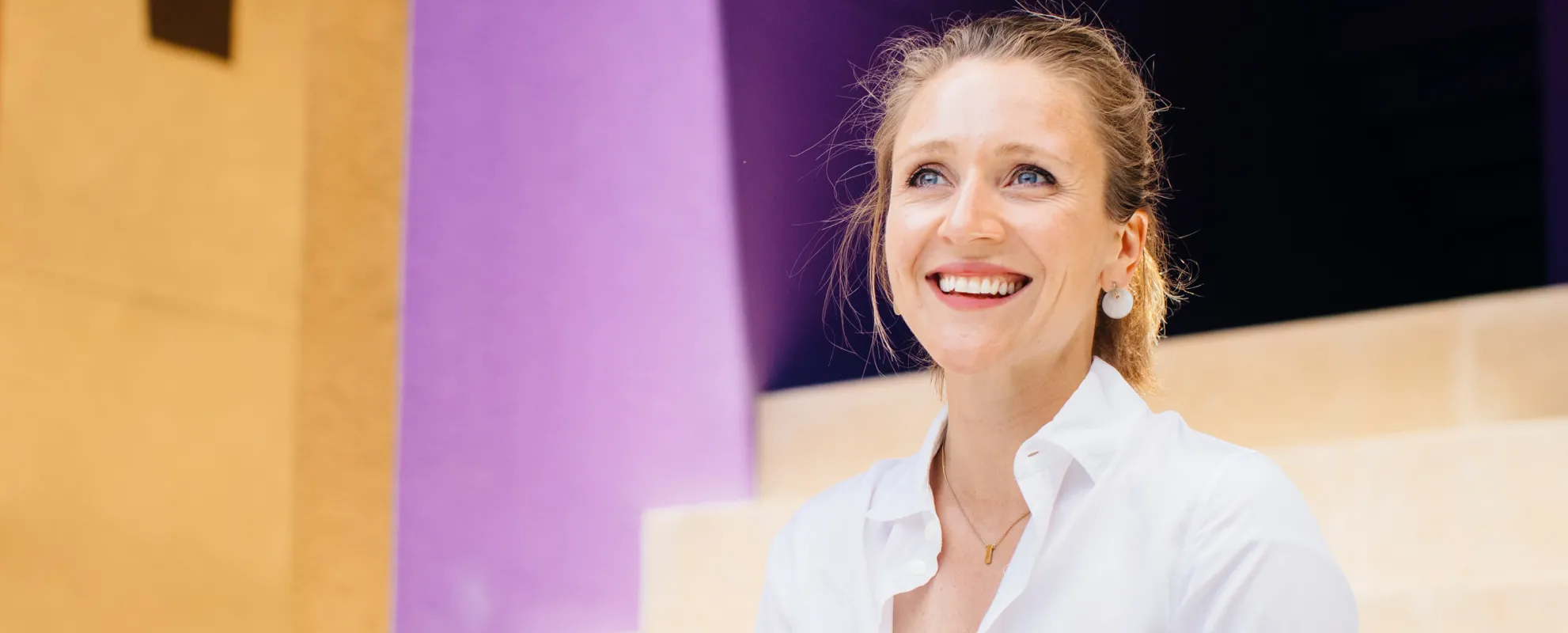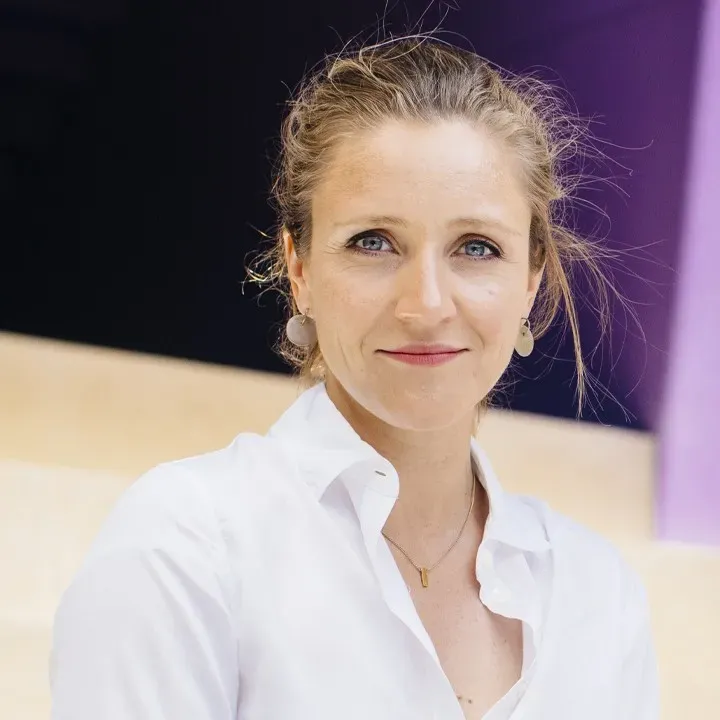Annabelle Williams has mastered the art of gracefully overcoming adversity. Born without the lower half of her left arm, Williams credits her success — as a Paralympic swimmer, as a motivational speaker and lawyer, and as a new mother to toddler daughter Josie — to the challenges she faced from birth.
She was scheduled to attend Stanford Executive Program in 2018, but realized two months after being accepted that she was pregnant. She deferred until 2019, and the program turned out to be, literally, life-changing.
“At the time I was the general counsel for the Australian Olympic Committee, a role I had been in for about five years,” Williams says. “My mentor did his MBA at Stanford a while ago and gave me the book The Business of Sports: Text and Cases on Strategy and Management by Stanford GSB professor George Foster, and since reading it I had this seed planted in my mind that I wanted to go to Stanford.”
Not long after, she pivoted into a new career as a sports and business consultant, motivational speaker, and diversity advocate who today inspires audiences to be vulnerable, courageous, and — most of all — kind.
Why did your career path change after completing SEP in 2019?
I have always done a lot of speaking, but when I was at Stanford GSB I was asked to deliver a keynote speech to my class, which consisted of about 220 people from 48 countries. Afterward, I had several people tell me I should do speaking as a full-time gig. I realized maybe there was an opportunity to do more down this path. The experiences I had growing up with a disability, and then later my experiences as an elite athlete, helped me develop skills I think I took for granted — resilience, grit, determination, fearlessness, empathy — and that seem to resonate with audiences. The experience had such a fundamental impact on me that I came back to Australia and resigned from my job and incorporated a company.
So what has life been like since then?
From August 2019 until March 2020 it was an amazing whirlwind of traveling and speaking in front of audiences all over the world. I partnered to develop content with some platforms whose values align very closely with mine, such as the women’s health platform Flo Health, whose founder was in SEP with me. I did a TED Talk at the end of February about the importance of kindness — which ended up being good timing for that message. I also had an extraordinary experience in March speaking at a Saudi oil company on International Women’s Day. I had to rush home so I wouldn’t get stuck away from my family during the COVID crisis. I’ve spent the lockdown months launching a new brand and developing digital master classes, which I’m excited to launch in a few months’ time. I’m also writing a book, which will be released in late 2021.
The key message of your TED Talk was “how can you help someone up the stairs today?” Is that message particularly relevant during this pandemic?
Small acts of kindness are crucial right now. In our neighborhood, people are putting teddy bears in the windows for little kids, and my daughter thinks all of these teddy bears come to the window to say hello when she walks past. That’s a very kind thing to do, to recognize that this would mean a lot to kids who are confused about what’s going on, and who can no longer go on playdates, or go to childcare, or see their grandparents. There are all sorts of things like this happening around the world right now. Never has it been more important to build a sense of community.
What about your own childhood made you particularly sensitive to that?
That’s the stuff that built me up as a young girl with a disability. When I look back, I’m sure I was confident because people were kind to me and supported me. I had these networks where I wasn’t made to feel different or like an alien or left out. I always knew I had a safe place at home where I could tell my parents what had happened, and they allowed me to feel vulnerable and upset. But they also provided me with the skills to overcome it. That’s invaluable stuff.
Your titles include lawyer, athlete, TV commentator, TED presenter, Hollywood stunt double, wife, and mother — all by age 31. What’s the most important factor in your achieving so many goals in such a short period of time?
I was so determined. I was the first person in my primary school class to learn how to tie my shoelaces because one of the teachers suggested that I might not be able to do it with one arm. So every day for a week I was trying to tie everyone’s shoelaces in the house because I very much felt the need to prove that having one arm was not going to be a limitation. My parents were always very supportive, but they never really pushed me. I probably pushed myself enough.
And that determination carried through in you as an adult?
In 2006 I was on my first Australian swim team and I was also trying to get into law school. I was swimming six to eight hours a day and missed about 10 weeks of school for competition. I realized that when I was swimming I was really anxious about needing to study, and when I was studying I was anxious about swimming. That year I developed this ability to compartmentalize or focus on just one thing at a time to help me get through what I thought would be the busiest year of my life. This has allowed me to be super present in whatever I’m doing, which actually allows me to fit in more things.
Do you think the 2020 Tokyo Olympics and Paralympics should have been postponed due to COVID-19?
A lot of people are still in shock that this has happened. Sport, in general, is in a very challenging position globally. It relies heavily on people sitting in stadiums and on broadcast revenue, so it’s having a huge impact on every sport around the world and it has put everyone who works in the movement in a challenging situation. For some athletes this will be a good thing, like those who are injured or who’ve had to take a break from training. But there also will be people who would have become household names who now never will, because a year is a long time in a high-level sport. Maintaining that level of training and dedication and focus, particularly when you can’t actually train right now, is a real challenge.
But aren’t most athletes pretty resilient?
Very. Particularly Paralympic athletes. Every Paralympian has overcome significant challenges, either being born with a condition or acquiring a disability. Athletes are finely tuned, but you also have to develop a robustness to understand that things don’t go as planned most of the time, and that’s a part of sport. So athletes are good at controlling their mindset. The people who can just focus on each day, one day at a time, and train the best they can from home, they’ll be alright. But this is certainly a challenging time.
You once said you believe everyone has a disability, referencing a scene from the Pixar movie Finding Nemo. Can you explain what you meant by that?
One in five people have a diagnosed disability, but everyone has something they struggle with. A lot of disabilities are invisible, like those who struggle with mental health. People don’t know how to talk about that, and they have to deal with that internally. As a child I was afraid that boys wouldn’t like me because I only had one arm. I mentioned that in my TED Talk, and a friend told me afterward that at that age she thought boys wouldn’t like her because she had freckles. So everyone has an insecurity, and I think the fact that mine was so obvious helped me develop a strong sense of self and also helped me empathize with other people. In the Nemo movie one of the characters states, “I’m obnoxious!” I remember watching the movie and thinking, “I’d rather have one arm than be obnoxious.”
Tell us about your mission as a diversity advocate, and why you feel that’s important.
I’ve seen how much richer every aspect of our lives is if you have people from all backgrounds and who look different and sound different. I’ve seen a number of my bright and educated friends miss out on job after job after job because of disability. I think if there are two candidates of equal standing most employers would choose the able-bodied person simply because it’s too awkward to have the conversation about what the disabled candidate would require. People with disabilities end up losing jobs because of it and employers miss a huge amount of untapped potential. But I’ve been so inspired by people with disabilities. All of us underestimate what people are capable of.
So how are you trying to address that problem?
I work with organizations, from corporations to educational institutions, athletes and diversity councils, about the importance of equality and inclusion. When every single decision in an organization is made, it should be viewed with a filter of diversity over it.
What role do you feel sports can play in that mission?
The Olympic Games are unbelievable because you’re seeing the best athletes in the world, and that is extraordinary, but the Paralympics is jaw-dropping. People are only limited by their imaginations and can push their boundaries a lot more than they think they can. People with disabilities are brilliant problem-solvers because every single day of their lives they’ve had to problem-solve. Most people just see the disability. They don’t see that they’re equipped with all these extra skills that able-bodied people tend not to have, such as problem solving and overcoming adversity. Netflix recently released a documentary called Rising Phoenix showing the awesome power of the Paralympic movement.
As a sports reporter and motivational speaker, what do you think makes a good story?
When I experience a situation that has an impact on me, I love figuring out how to describe it in order to recreate that emotion for my audience. That’s what I love about telling stories. I think authenticity is the key, and that sometimes requires you to be quite vulnerable. And that’s something I’ve had to develop because it’s hard being vulnerable in front of thousands of people. I used to tell stories in a way that made it sounds like “I had this challenge, and then I overcame it,” because I just try to forget the bad stuff and focus on the positive. Someone once told me it would be powerful to hear about the struggle. So now I’m super honest about how I felt in certain situations. Some stories are funny, some are more evocative, but no story should be all one thing. You need both the ups and the downs to have the most impact.
Photos by Elena Zhukova


